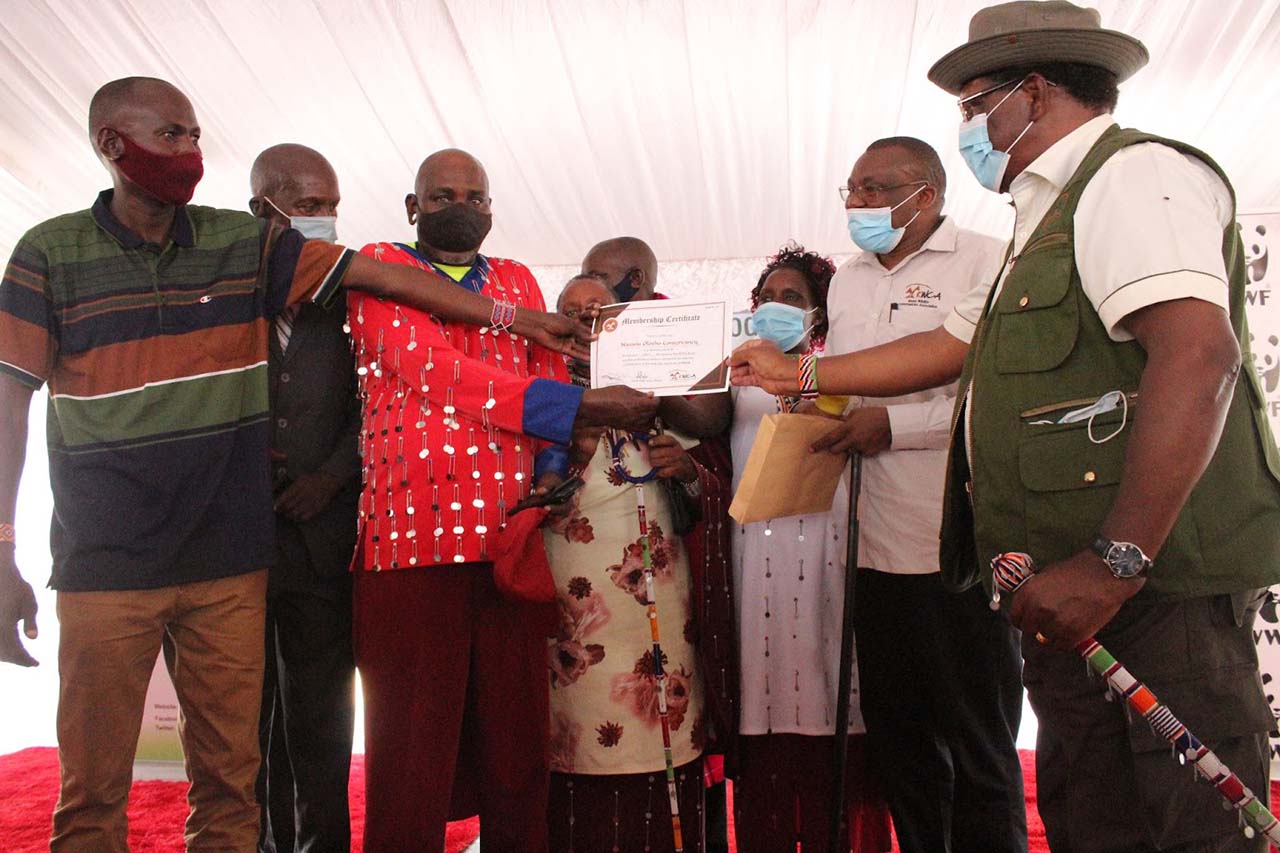Ministry of Environment and Forestry Cabinet Secretary (CS) Keriako Tobiko witnessed the issuance of certificate of registration to Nasaru-Olosho Conservancy by the Kenya Wildlife Conservancies Association Director Dickson Kaelo, marking a new journey for the community in the landscape straddling three expansive locations with a population of 15,000 people
At the ceremony marked in Kajiado County during the International Day for Biological Diversity on May 22, the Environment Cabinet Secretary also donated 450 beehives to Nalepo Women Self-Help Group popularly known as the Bee Queens of Nasaru-Olosho, one of 14 women groups in the larger Maasai Mara, Amboseli and Tsavo landscapes that have ventured into beekeeping to earn a living and help protect the crucial pollinators.
The nature-based enterprise project is one of the initiatives spearheaded under the WWF-Kenya Southern Kenya Landscape Programme, an area located along the green rolling Chyulu hills in the southern Kenya wildlife corridor next to the Amboseli National Park.
Speaking during the ceremony, our Chief Executive Officer Mohamed Awer said the conservancy’s action plan covers human wildlife conflict mitigation.
“We want justice. We want equity. We want inclusion. We want diversity. Even among the conservancy rangers, we want to see more women. We come as partners. Nasaru-Olosho is a creation of the community. We only want to maintain the partnership. We want to be part of the effort, not the controllers of the effort,” said Awer.
Our Southern Landscape Manager Dr Martin Mulama said the nature-based economic projects like beekeeping were initiated to empower women since they are usually left out in initiatives for livelihood improvement, a noteworthy venture since it marks the first time women in the community are venturing into the nature-based enterprise.
“Our intervention in the Southern Kenya landscape is focused on a range of community-led livelihood projects beyond the provision of beekeeping equipment. At WWF-Kenya we look at the entire value chain from training, market linkages to value addition. We do our best to mainstream gender in the agenda. In this case our emphasis is on women and youth because they are marginalized. We focused this particular activity on women. Different women groups have been trained not just on how to keep bees, and harvest honey, but on what they could get beyond the honey,” said Dr. Mulama.
Key stakeholders who attended the event include: National Environment Management Authority Director General Dr Mamo B Mamo, Kenya Wildlife Conservancies Association CEO Dickson Kaelo, National Environment Trust Fund (Kenya) CEO Samson Toniok, Kenya Forest Service Commandant Alex Lemakoko, representatives from Kenya Wildlife Service (KWS), Kenya Water Towers, National Environment Tribunal and others.
During the event, CS Tobiko inspected our joint solar-powered boreholes initiative in the landscape funded by the German Federal Ministry of Economic Cooperation and Development (BMZ) as well as participated in a tree planting drive spearheaded by local schools and community scouts.
Through the support from the program, we installed solar-powered elephant deterrent fences around seven schools with fully fitted solar lighting systems, constructed six concrete water harvesting tanks with a capacity of 50,000 cubic meters each and renovated a 100,000 cubic meters tank in one of the schools, trained community scouts in collaboration with KWS, drilled four solar-powered boreholes (one for each of the four group ranches).
In addition to the beehives we donated to 14 women groups, we provided four motorbikes to be used by community scouts, 10 predator-proof bomas, camera traps, binoculars, lion lights, and Global Positioning System (GPS) devices.




